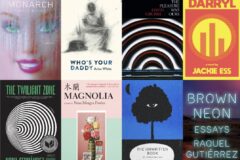Release Date: June 16, 2015
Label: Love/Interscope Records
Let’s talk about trilling. The rapid, stuttering vibration in what would otherwise be a long, smooth note can, when used in a non-gimmicky fashion, give off a moving and anxious feeling of venerability while on a technical level showcasing precise control. This powerful, almost paradoxical musical tool, has its roots in older Baroque music and a newfound appreciation in trippy production, is fittingly integral to the much-hyped pop newcomer Ryn Weaver, who burst onto the scene last summer with her electrifying “OctaHate.” Her confidently unsteady voice has a refreshing energy, serving as a cohesive, quivering throughline for her intentionally nomadic debut, The Fool.
Weaver, born Erin Wüthrich, comes across as a troubadour, singing lovely, wistful traditional traveling songs, only she’s packed slick, modern synths and is caravanning with her talented cabal of producer friends (Passion Pit’s Michael Angelakos, Charli XCX, Benny Blanco, and Cashmere Cat). The stylistic mash makes for quite a trip, and the wandering themes of her music (not to mention her drifting new-age persona) afford the album plenty of freedom to go down interesting paths. Some of these explorations are less successful than others — the vague, experimentally static-laden last track “New Constellations” is an unsatisfying way to close out an otherwise momentous album — but most of Weaver’s journeys reach rewarding and frequently touching heights.
“OctaHate,” remains the intense, heart-pounding standout, as nothing else on The Fool quite matches the unexpected, thrilling juxtaposition of that marimba line and harsh, wildly thrashing breakdown. It represents the stormiest peaks of the LP, but for much of the album Weaver travels through more relaxed, engaging, and sometimes strange valleys, like “Pierre,” an electronic-tinged folk song about the various former loves that lead to the narrator’s current fling. (It’s not the title character — he “spoke in broken English but the heart was there.”)
In what’s probably the album’s weirdest moment, the end of “Traveling Song” has the music drop away, leaving only Weaver’s a cappella coda — a beautiful bit of spoken word poetry that draws meaning from the diverse and oddly specific shout-outs to queens, turtle soup, and Apollo 13. Pitch Perfect might be getting a threequel, but Weaver’s time-blending songwriting seems more like an earnest expression than attempt to cash-in on a trend. The title track probably does the best job of bridging the gap between techy-bangers and Weaver’s more restrained musings. And despite the notoriety and ferocity of her debut track, many of the slower, more meandering songs end up being the most stirring. “Here Is Home” especially takes advantage of Weaver’s trademark trill, turning what could otherwise be a pretty but pat chorus into a soaring, complex wash of palpable emotion.
Much of the conversation about Weaver has, as often happens with hyped new artists, revolved around whether or not she lived up to the Internet’s expectations. Thing is, that doesn’t seem like it was ever the focus of her confident, freewheeling and at times weird debut. Her expressive wanderings just so happened to lead her to a thrilling, trilling destination.





